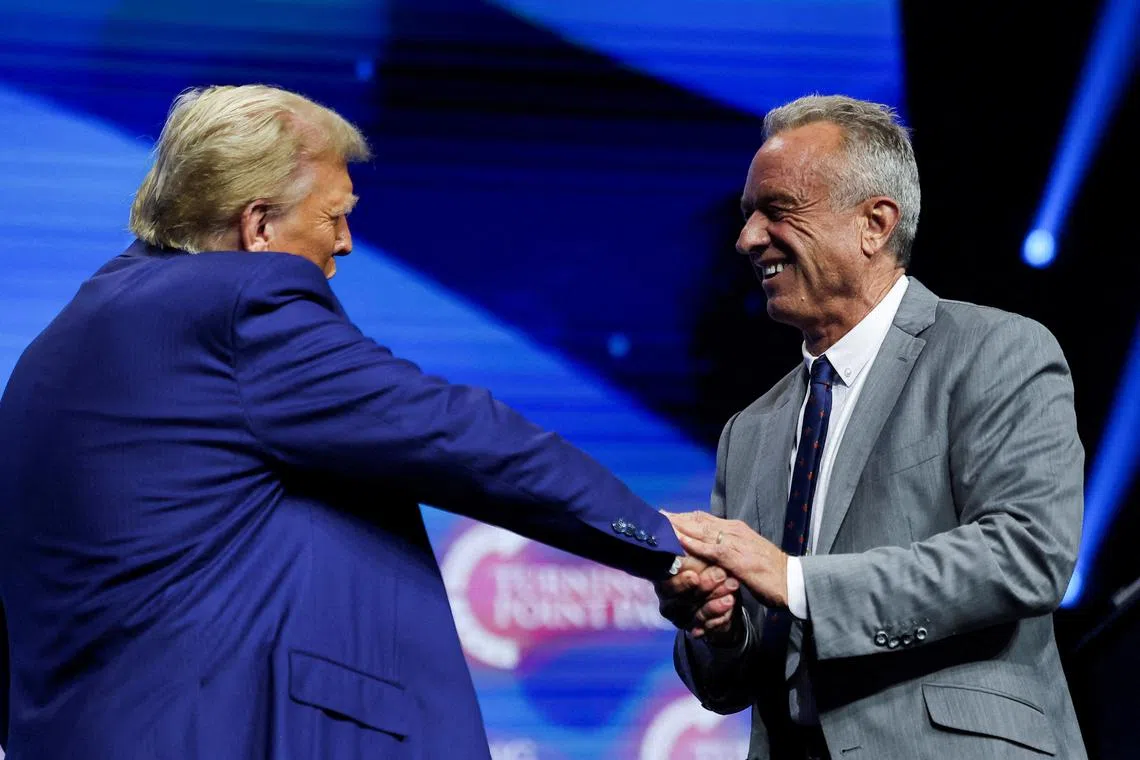Trump nominates vaccine sceptic Robert F. Kennedy Jr to lead top US health agency
Sign up now: Get ST's newsletters delivered to your inbox

Mr Robert F. Kennedy (right) has been a part of Donald Trump’s transition team and reviewing resumes for the top jobs at US health agencies.
PHOTO: REUTERS
WASHINGTON – President-elect Donald Trump said on Nov 14 that he has selected Mr Robert F. Kennedy Jr, an environmental activist who has spread misinformation on vaccines, to lead the Department of Health and Human Services (HHS), the US’ top health agency.
Mr Kennedy ran for president in the 2024 election as an independent before dropping out in August and endorsing Trump in exchange for a role in the Republican’s administration.
Mr Kennedy, the son and nephew of two titans of Democratic politics, has frequently talked about tackling what he calls the “chronic disease epidemic” of conditions including obesity, diabetes and autism, and reducing chemicals in food.
“The safety and health of all Americans is the most important role of any administration, and HHS will play a big role in helping ensure that everybody will be protected from harmful chemicals, pollutants, pesticides, pharmaceutical products and food additives that have contributed to the overwhelming health crisis in this country,” Trump said in a post on social media.
The HHS oversees drug regulation, public health agencies including the Centres for Disease Control and Prevention (CDC) and health insurance for more than 140 million people, including the poor, those aged 65 and older, and the disabled through Medicare and Medicaid.
HHS had a US$3.09 trillion (S$4.15 trillion) budget for fiscal year 2024, representing 22.8 per cent of the US federal budget.
Mr Drew Altman, president of health research firm KFF, described the move as historic, and said what Mr Kennedy, if confirmed, would ultimately do in the role remains to be seen, given that he has not often discussed programmes like Medicaid and Medicare, which account for much of the US health budget.
“Historically, secretaries have been people with real experience and standing in national healthcare, and he certainly is not that, and has views from outside the mainstream, and is a renegade appointment,” Mr Altman said.
The appointment, which had been seen as a possibility for weeks, raised concern among some public health advocates who said Mr Kennedy could have a negative role in Americans’ health, given his power over these agencies. The Democratic Party decried the decision.
Some politicians and business groups supported the nomination, such as the National Community Pharmacists Association, which said it was encouraged by his willingness to take on corporations.
Health priorities
Mr Kennedy has been a part of Trump’s transition team and has been reviewing candidate resumes for the top jobs at US health agencies.
He has suggested he would gut the 18,000-employee Food and Drug Administration (FDA) – which ensures the safety of food, drugs and medical devices – and replace hundreds of employees at the National Institutes of Health.
“FDA’s war on public health is about to end,” he wrote on X in late October, saying that includes its “aggressive suppression” of psychedelics, peptides, stem cells, raw milk, sunshine and other items.
“If you work for the FDA and are part of this corrupt system, I have two messages for you: 1. Preserve your records, and 2. Pack your bags,” he wrote.
In early November, he said he would recommend that fluoride be removed from public water supplies, falsely claiming on X that the chemical is associated with bone fractures and cancer.
In a New York Times opinion article published in September, Mr Kennedy criticised the popular Novo Nordisk weight loss drug Ozempic, saying: “Instead of fixing our food system and addressing the obesity crisis at its root, the author focuses on a drug that may palliate the symptom – and gladden the wallets of distant Big Pharma execs.”
Dr Ashish Jha, former White House Covid-19 response coordinator and dean of the Brown University School of Public Health, said: “Most people don’t realise this is not about fluoride in water, or even vaccines, as important as they are. The HHS secretary oversees Medicare. He and his appointees will decide what (medicine is) available to the American people.”
Vaccines
Shares of vaccine makers including Pfizer and Moderna fell after news of Mr Kennedy’s appointment and were down in after-hours trading by as much as 2 per cent.
Mr Kennedy has been criticised for making false medical claims,
He opposed state and federal restrictions imposed during the Covid-19 pandemic and was accused of spreading misinformation about the virus.
He disputes the anti-vaccine tag, saying he wants more rigorous testing of vaccines instead. However, he chaired the Children’s Health Defence, a non-profit organisation that focuses on anti-vaccine messaging.
In an interview in March, when he was still running for president, Mr Kennedy said Americans who want a vaccine for themselves or their children would continue to have access to them if he were to be elected. But he said he doubted the efficacy of measles vaccines.
Measles is one of the most contagious human viruses and is almost entirely preventable through vaccination. It requires 95 per cent vaccine coverage to prevent outbreaks among populations. US coverage rates have fallen below that level among young children, the CDC said in November.
Vaccines have saved over 154 million lives in the 20th century – the equivalent of six lives every minute of every year for the past 50 years, said Dr Michael Osterholm, an infectious disease expert from the University of Minnesota.
“Immunisation has continued to be the single greatest contributor of any health intervention to ensuring that babies not only see their first birthdays, but (also) continue leading healthy lives into adulthood,” he said. REUTERS


